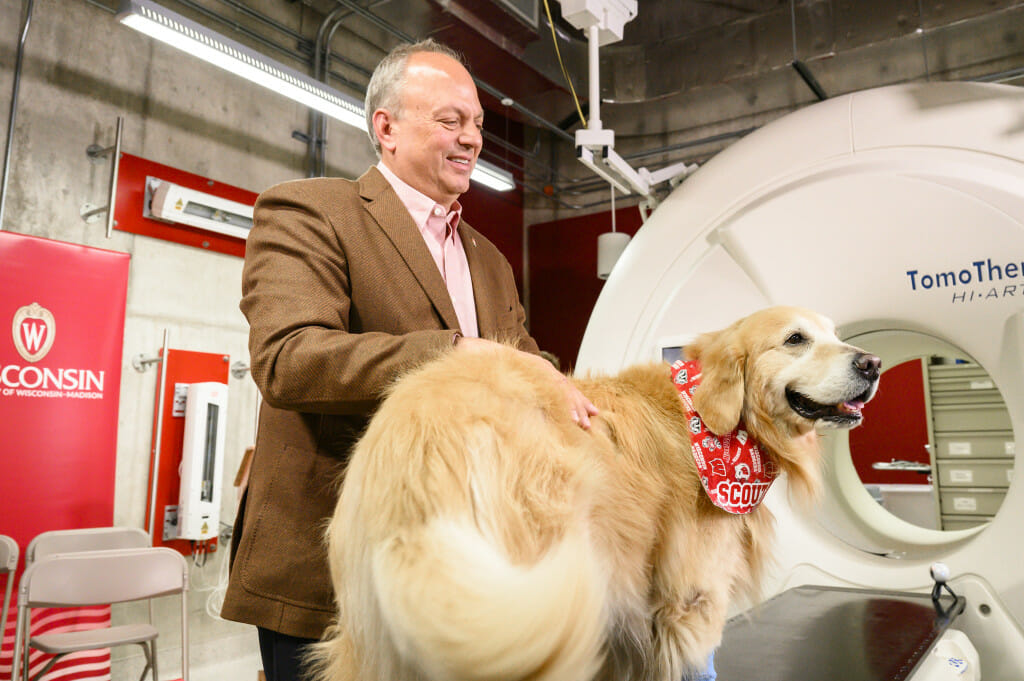Legacy continues for dog whose cancer treatment at UW–Madison inspired millions

WeatherTech Founder and CEO David MacNeil (left), with Scout at an event at the University of Wisconsin School of Veterinary Medicine on January 28, 2020 celebrating the release of a Super Bowl commercial featuring the school and Scout, a 7-year-old golden retriever. Since Scout’s heartwarming story was first shared globally, more than a million dollars have been raised to support the School of Veterinary Medicine’s efforts to better diagnose, treat and prevent cancer and identify new cancer-fighting drugs and treatments. Photo: Bryce Richter
Long after the last play was called in the 2020 Super Bowl and fans and players left the stadium, an amiable golden retriever named Scout, who appeared in a 30-second commercial during the game’s second quarter, has continued to inspire animal lovers worldwide.
The 2020 commercial, titled “Lucky Dog,” shared Scout’s cancer treatment journey at the University of Wisconsin–Madison School of Veterinary Medicine and encouraged viewers to donate to the school’s cancer research efforts. Scout was part of the family of David MacNeil, founder and CEO of WeatherTech. The company, a manufacturer of automotive accessories and home and pet care products, paid for the ad.
Scout passed away in March 2020 but will make an in-memoriam appearance in WeatherTech’s 2023 Super Bowl commercial this Sunday. Viewers can continue to support the Pets Make a Difference Fund to advance cancer treatments and technology at the UW School of Veterinary Medicine.
Since Scout’s heartwarming story was first shared globally, more than a million dollars have been raised to support the School of Veterinary Medicine’s efforts to better diagnose, treat and prevent cancer and identify new cancer-fighting drugs and treatments. New and recurring donors from all 50 states and around the world have made gifts toward the school’s cancer research as recently as last week.
Gifts helped make possible the purchase of a cutting-edge radiation therapy delivery system called Radixact, installed in fall 2020 at the UW School of Veterinary Medicine’s teaching hospital, UW Veterinary Care. UW Veterinary Care is currently the only veterinary medical hospital globally to offer treatment with the Radixact system, bringing several advantages for pets and their care providers.
“With this technology, we can now treat tumors and spare healthy tissue with more confidence and accuracy, in addition to targeting tumors in areas of the body that we couldn’t previously,” says Professor Lisa Forrest, head of UW Veterinary Care’s Radiation Oncology Service.
Most significantly, the upgraded system provides real-time, adaptive motion tracking of tumors. The treatment delivery beam is continuously synchronized as a tumor moves due to breathing, digestion or patient movement.
This real-time tracking ensures the tumor gets all the radiation it needs while surrounding tissues get as little radiation as possible. It also opens new treatment opportunities for cancers in the abdomen and thorax — including lung, heart, liver and kidney tumors — where the proximity of vital organs and other sensitive tissues made radiation therapy previously difficult or impossible.
A recent additional upgrade to the Radixact system allows for faster optimization of radiation plans, making them more efficient and paving the way for quick but accurate treatment plans for urgent, critical cases.
Gift support inspired by Scout’s story also allowed the hospital’s Oncology Service to hire an additional clinical trials intern (a post-graduate veterinarian pursuing advanced training) to pursue more clinical trials of new cancer therapies and meet client demand for trial participation.
UW School of Veterinary Medicine oncologists see thousands of patient visits annually (cancer is the number one cause of illness and death in the aging dog population) and are world-renowned for advancing clinical treatments for animals with cancer. Their work benefits UW Veterinary Care patients and people battling cancer worldwide, as clinical findings often translate to treatment and technology innovations for both veterinary and human medicine.
In addition, funding in Scout’s name has made possible research focused on hemangiosarcoma, the type of cancer Scout faced. This aggressive cancer of blood vessel walls is common in dogs.
This spring, the school will launch a two-year clinical trial of a new anti-hemangiosarcoma vaccine led by David Vail, a professor of comparative oncology. The vaccine targets approximately 40 antigens, or molecular recognition markers, found on hemangiosarcoma cancer cells. Clinicians will deliver the vaccine in combination with standard surgery and chemotherapy to bolster treatment.
“The vaccine is designed to train the dogs’ immune system to recognize these markers and to seek out and destroy spreading hemangiosarcoma cancer cells left behind after surgery and chemotherapy,” Vail explains.
Beyond financial support, Scout’s story and legacy have provided an unprecedented opportunity to highlight on a global stage the importance of veterinary medicine for animals and people, and the UW School of Veterinary Medicine’s impact in advancing innovative therapies for cancer and other devastating diseases.
The school’s comparative oncology work emphasizes a bidirectional flow of findings between veterinary and human medicine. According to Vail, a fundamental goal is to raise the current standard of cancer care. For animal and human patients, recurrence and metastasis (the spread of cancer) for aggressive tumors is “a very real problem.”
“We have such a long way to go both in physician-based and veterinarian-based oncology,” he says. “It’s a huge need that we are working to move forward.”
